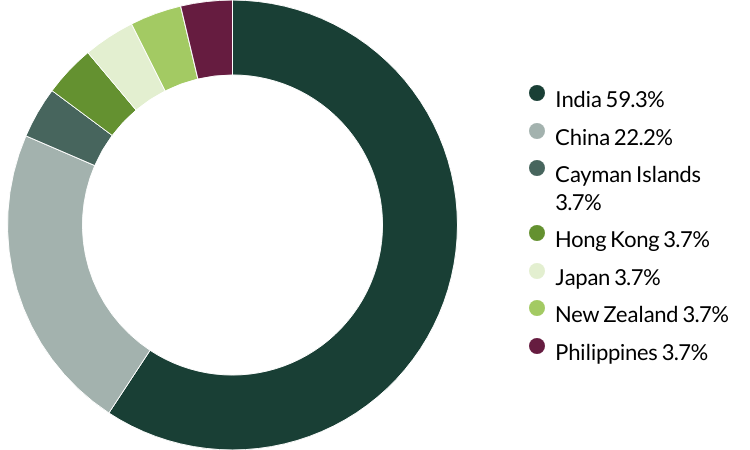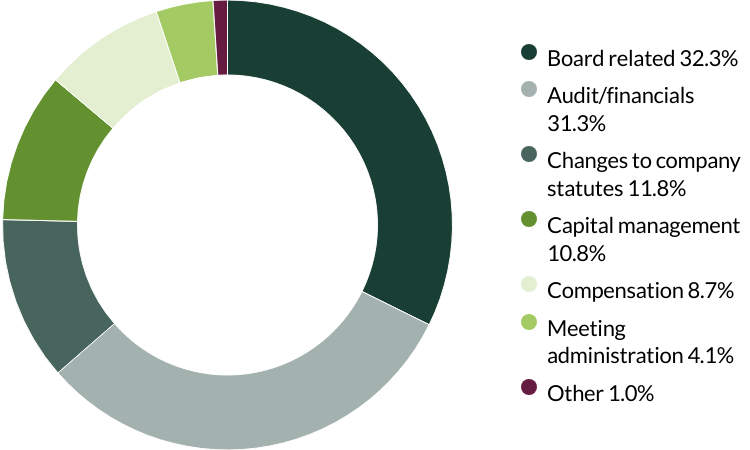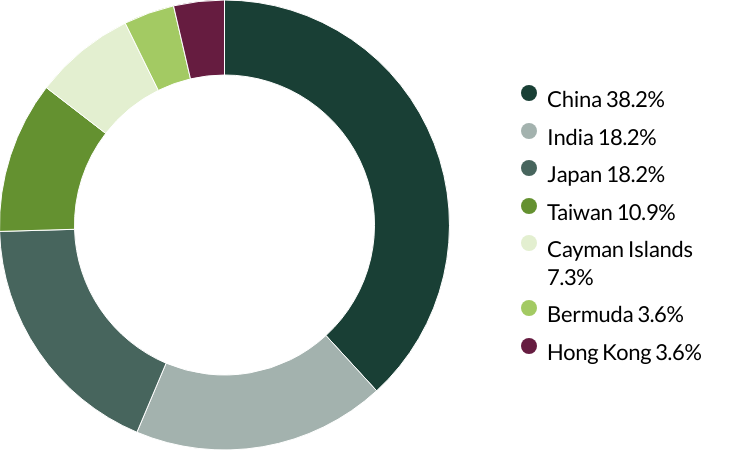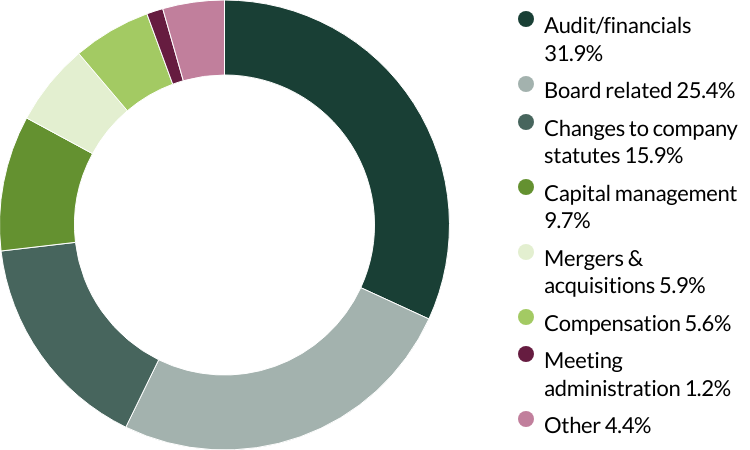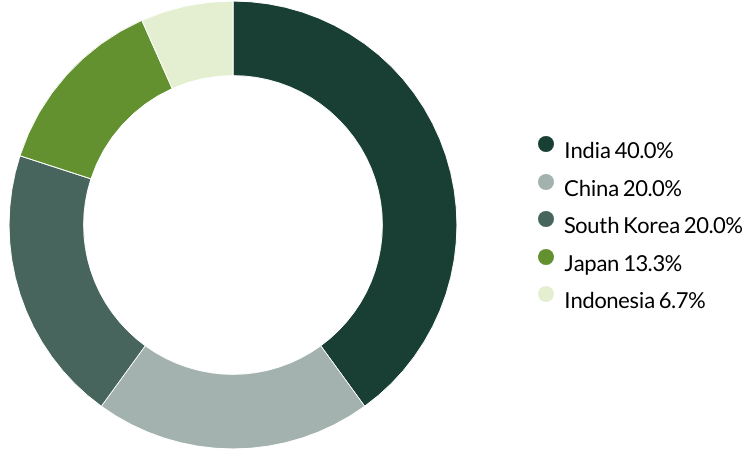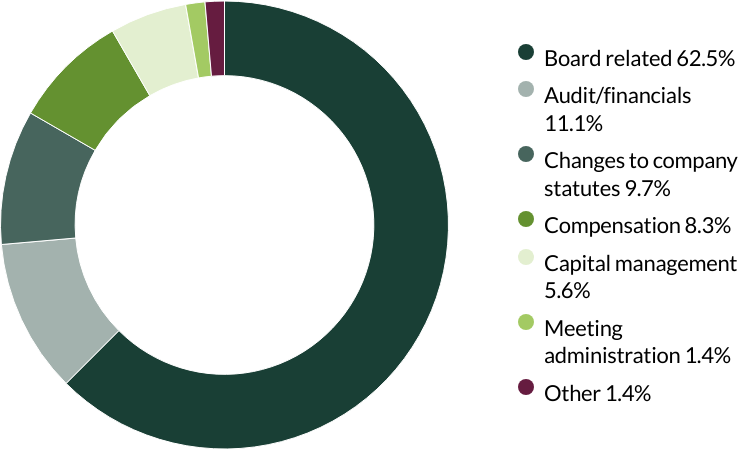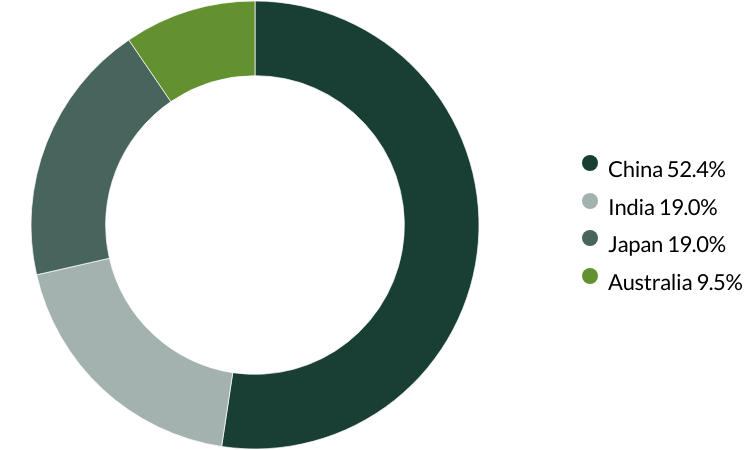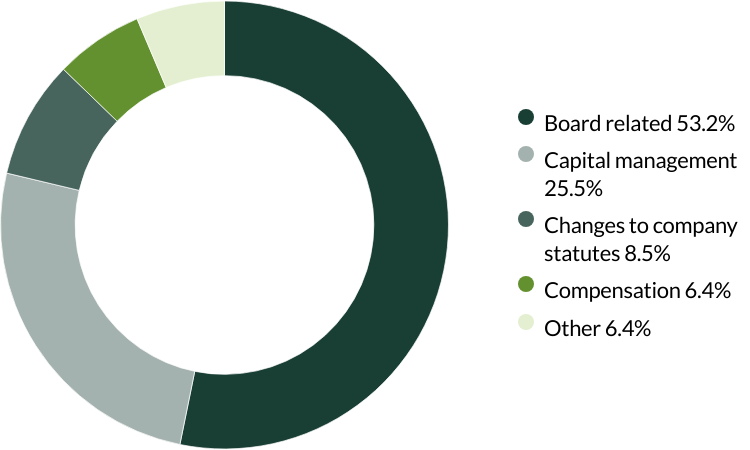Get the right experience for you. Please select your location and investor type.
IMPORTANT NEWS: Transition of investment management responsibilities
First Sentier Group, the global asset management organisation, has announced a strategic transition of Stewart Investors' investment management responsibilities to its affiliate investment team, FSSA Investment Managers, effective Friday, 14 November close of business EST.

Asia Pacific and Japan All Cap
The strategy was launched in June 1988, and since September 2019 has been a dedicated sustainability strategy. This equity-only strategy aims to achieve long-term capital growth by investing in a portfolio of between 30-60 companies in the Asia Pacific region, including Japan, that are helping to bring about a more sustainable future.
The ability to invest directly in Japan allows clients to own high-quality Japanese companies far earlier in their Asian growth journeys, as well as accessing a greater pool of domestic companies with attractive growth opportunities that are positioned to contribute to, and benefit from, sustainable development.
The strategy was launched in June 1988. It invests in the shares of between 30-60 companies in the Asia Pacific region.
You can see all of the companies that this strategy invests in by filtering on our Portfolio Explorer tool.
- We define investment risk as losing clients’ money – this means we focus on looking after your money as well as growing it
- Companies must contribute to sustainable development and make a positive impact towards a more sustainable future. Portfolio Explorer >
- We invest in high-quality companies with exceptional cultures, strong franchises and resilient financials. How we pick companies >
- We avoid companies linked to harmful activities and engage and vote for positive change. Our position on harmful products >
Quarterly updates
Strategy update: Q3 2025
Asia Pacific and Japan All Cap strategy update: 1 July - 30 September 2025
Review: continuity and change
On one level, the third quarter saw significant changes at Stewart Investors. After acting as careful stewards of our clients’ capital over many years, three of our colleagues stepped back from their portfolio-management responsibilities in August and left the business.
While our team looks slightly different now than it did when the quarter began, on a deeper level, nothing has changed: the philosophy and approach that has defined Stewart Investors since 1988 is deeply engrained and continues to define what we do. Our structure is flat. Every member of the investment team is first and foremost an analyst and our collective focus is on identifying high-quality companies. This is the bedrock on which returns from all our strategies, including Asia Pacific and Japan All Cap, have been built.
This strategy’s manager, meanwhile, has not changed. Doug Ledingham continues to apply the same principles to managing this strategy that have guided it since its launch, working as part of the same tight-knit group of investment analysts and drawing on a common pool of investment ideas.
Who will be the long-term winners of the artificial intelligence (AI) investment boom?
Our clients have understandably been keen to discuss the changes that have taken place within our business. Set against that, however, we have been careful to ensure that the majority of our time and attention remains on companies. As part of this, we have been discussing the broader forces being felt by companies across the Asia Pacific region, particularly the extraordinary surge of investment in AI. Although AI is often viewed as a US-focused phenomenon, many of its leaders are actually found in Asia rather than America. They include the manufacturers of the advanced semiconductors that supply computing power to data centres, the companies whose technology tests those semiconductors for reliability, and the suppliers of essential components to data centres.

We are aware of the intense geopolitical pressures that surround some of these companies, such as the desire to shift production of semiconductors to the US to keep the most advanced chips out of the hands of America’s perceived enemies. These pressures may influence corporate behaviour in a way that is not to the advantage of long-term shareholders. This is something we are debating and watching closely. To deepen their understanding of this subject, two members of our team recently visited South Korea, which, along with Taiwan, is at the heart of the global semiconductor industry.
The number of companies entering and leaving the portfolio remained typically low. We added two new holdings while making no complete sales.
Activity
New holding: AIA (Hong Kong: Financials)
Over the course of more than a century, the life insurer AIA has steadily developed a distinct culture combining a conservative approach to investment with an entrepreneurial structure. Its business is built around a high-quality salesforce who foster long-term relationships with their customers. AIA demands higher levels of professionalisation from its agents than many of its competitors, who often rely on armies of part-time agents. Although this means there have been times when AIA has grown more slowly than its peers, putting the needs of its customers above drive for short-term expansion has enabled it to build a premium brand. It now has an opportunity to grow by fulfilling unmet insurance needs across China, India and Southeast Asia. While those countries are getting richer, they lack social safety nets, making insurance products a necessity. This is especially true in China, where the regulator has recently allowed AIA to expand into new regions beyond its historical areas of strength in Beijing, Shanghai, and the Pearl River Delta.
New holding: Jardine Matheson (Hong Kong: Industrials)
Jardine Matheson is a complicated company whose journey towards greater simplicity and professionalisation has the potential to reward patient investors. The current chairman inherited a sprawling conglomerate whose interests span retail, property, financial services, healthcare, autos, construction equipment, hotels, and mining. His vision is to appoint high-quality professionals to run the company’s various business units, giving them well-defined targets and then granting them autonomy to hit those targets. He keeps a deliberately low profile and acknowledges the missteps the business has made over the past decade. Both are valuable signals of humility. He has sold a number of businesses not viewed as being central to the company’s long-term growth story in a way that would have previously been unthinkable.
Source for company information: Stewart Investors investment team and company data. This stock information does not constitute any offer or inducement to enter into any investment activity. Portfolio data shown is from representative strategy accounts of the strategy shown above. Named new investments disclosed relate to holdings with a portfolio weight over 0.5%. It is not a recommendation or solicitation to purchase or invest in any fund. Differences between the representative account-specific constraints, currency or fees and those of a similarly managed fund or mandate would affect results.
Strategy update: Q2 2025
Asia Pacific and Japan All Cap strategy update: 1 April - 30 June 2025
Shortly after the quarter began, President Trump announced his ‘Liberation Day’ tariffs. With China responding in kind, the prospect of a sharp contraction in global trade saw markets worldwide – including those in Asia – falling sharply.
Within a matter of days, however, a fall in the US dollar and the threat of a rout in the US government bond market encouraged the president to impose a 90-day pause on introducing many of his tariffs. As the world pulled back from an outright trade war, Asian markets rallied, with the gains being led by markets in the export-dominated economies of South Korea and Taiwan. Given our enthusiasm for a number of India’s high-quality, entrepreneurial companies, we were pleased to see share prices in that country starting to rally off the lows seen earlier in the year. The rally was aided by a cut in interest rates but also, we would argue, by valuations that appear attractive in view of those companies’ long-term growth potential.
Although share prices in some parts of Asia have recovered from the falls seen at the start of the quarter, the on/off discussions on tariffs have undoubtedly created lingering uncertainty. Some of the companies we have met are looking ahead to a potential resumption of talks on trade. Although we won’t try to predict their outcome, we would note that business leaders are often preparing for the worst while hoping for the best. While the market waits for greater clarity on trade, we continue as usual: seeking high-quality companies to invest in for the long term.
We added three new holdings over the quarter. Trip.com (China: Consumer Discretionary), a leading online travel agency, is set to benefit from the growth in the number of Chinese tourists travelling both domestically and overseas. Similar companies in the US and Europe have shown how attractive the economics of online travel platforms can be and have shown the tendency for market leaders in this industry to dominate their smaller rivals over time. Sea (Singapore: Communication Services) is the parent company of the Southeast Asian e-commerce retailer Shoppee. It has built a strong presence across the region by offering attractive prices, a wide selection and reliable delivery. We expect it to benefit from the growth of e-commerce across the region, from its expansion into the Brazilian market and by offering credit to Shoppee’s users and merchants. Motilal Oswal Financial Services (India: Financials) offers stockbroking, asset management, wealth management, investment banking, and housing finance. It is led by an ambitious-but-conservative steward and should benefit from meeting the savings and investment needs of India’s growing middle class.

We continued to add to our existing positions in Alibaba (China: Consumer Discretionary), DFI Retail (Hong Kong: Consumer Staples), and Ayala (Philippines: Industrials). We also added to Techtronic Industries (Hong Kong: Industrials), which makes power tools under the Milwaukee and Ryobi brands. Its share price fell sharply in response to President Trump’s tariffs. We have followed this company for more than two decades and have seen it emerging stronger from every crisis it has confronted in that time. This is testament to the focus and long-term orientation of its management team, who anticipated the recent tensions around trade by moving the majority of the company’s US-bound production out of China.
To finance these new investments, we sold our position in Advantech (Taiwan: Information Technology), whose valuation no longer appeared attractive. We also sold Unicharm (Japan: Consumer Staples) due to the increased competition it faces from local brands across region. We also sold our positions in Zhejiang Supor (China: Consumer Discretionary) and Syngene (India: Health Care) to fund better ideas elsewhere.
We estimate that, of the holdings in our Asian portfolios, roughly three-quarters are primarily focused on selling to their domestic markets, offering them a useful buffer amid ongoing concerns about potential disruptions to international trade. With valuations across Asia currently standing at what we regard as extremely attractive levels, we remain confident in the prospects for returns from our carefully selected high-quality companies.
Source for company information: Stewart Investors investment team and company data. This stock information does not constitute any offer or inducement to enter into any investment activity. Portfolio data shown is from representative strategy accounts of the strategy shown above. Named new investments disclosed relate to holdings with a portfolio weight over 0.5%. It is not a recommendation or solicitation to purchase or invest in any fund. Differences between the representative account-specific constraints, currency or fees and those of a similarly managed fund or mandate would affect results.
Strategy update: Q1 2025
Asia Pacific and Japan All Cap strategy update: 1 January - 31 March 2025
While broad Asia Pacific market indices edged slightly higher over the quarter in both US dollar and Australian dollar terms, they moved slightly lower in euro and sterling terms.
Perhaps of greater significance was that political turbulence resulted in some wide differences in returns on a country level. Market indices in China, South Korea and Singapore moved higher but fell across the rest of the region, with some markets suffering steep falls.
Most notable was the contrast in returns between India (which was down) and China (which was up). Investors’ enthusiasm for Chinese equities was, in part, a response to artificial intelligence (AI) company DeepSeek’s impressive demonstration of the progress the country is making in AI. And while there was less news from India, share prices fell back from high levels, as they did in many other parts of the world. Returns from the Indian market over the quarter were broadly in-line with those from the United States (US).
During the quarter, we bought S.F. Holding (China: Industrials), Mindray (China: Health Care) and Alibaba (China: Consumer Discretionary). We believe each of these companies has the potential to benefit from China’s increased emphasis on national self-reliance (producing more of its own goods and services and reducing imports). Over the last five years, the leaders of Chinese companies have, often for the first time, been tested by genuine economic and political instability. They have learned valuable lessons and many have become financially stronger, reducing their reliance on borrowing. This, in combination with valuations that appear modest by global standards, means we have been identifying a greater number of new investment ideas in China.
Elsewhere, we added a new holding in Ayala (Philippines: Industrials), a family-owned business group whose new management is focused on improving returns. In India, we added new holdings in Triveni Turbines (India: Industrials), a leading manufacturer of steam turbines and Bajaj Auto (India: Consumer Discretionary), a leading manufacturer of motorcycles, scooters and auto rickshaws.
We took advantage of lower valuations to add to our existing holdings in MANI (Japan: Health Care), Elgi Equipments (India: Industrials), Tube Investments (India: Consumer Discretionary) and Samsung Electronics (South Korea: Information Technology).
To finance these additions, we sold Fisher & Paykel Healthcare (New Zealand: Health Care), which could be vulnerable to new tariffs imposed by the Trump administration. Similarly, we sold Dr. Lal PathLabs (India: Health Care) and Cyient (India: Industrials) because of their potential exposure to changes in US trade policy. We sold Godrej Consumer Products (India: Consumer Staples), whose shares had begun to look expensive. Finally, we sold Nihon M&A Center (Japan: Financials) and Koh Young Technology (South Korea: Industrials) to fund better ideas elsewhere.
To control position sizes, we reduced our holdings in IndiaMART (India: Industrials), Tech Mahindra (India: Information Technology), Mahindra & Mahindra (India: Consumer Discretionary) and Japan Elevator Service (Japan: Industrials). We trimmed the holdings in Advantech (Taiwan: Information Technology), CSL (Australia: Health Care) and Vitasoy (Hong Kong: Consumer Staples) to fund additions to more attractively valued companies elsewhere.
After a long period in which returns from the US have outperformed those from most other regions, we hope investors will begin to pay attention to the attractively valued companies to be found in the Asia Pacific region. If the US economy falters, then economies across Asia will also be impacted, albeit to differing degrees. We are also conscious that political risks appear to be rising in many Asian countries. Those risks are not the same for every country or company. For example, the region’s large technology companies, many of which are found in Taiwan, South Korea and China, look particularly vulnerable to a global slowdown. India, by contrast, is more isolated from turbulence in the wider global economy. The Philippines, meanwhile, could receive a significant economic boost if a global slowdown results in a meaningful fall in oil prices.
Predicting how any of today’s economic and political challenges will unfold lies beyond our remit and our skillset. Fortunately, the Asian companies we invest in tend to have long memories; they still have the scar tissue formed during previous crises. These businesses have been forced to learn, to adapt and to become resilient. As a result, we believe they are set up not only to perform when conditions are fair but to navigate through whatever political and economic turbulence lies ahead.
Source for company information: Stewart Investors investment team and company data. This stock information does not constitute any offer or inducement to enter into any investment activity. Portfolio data shown is from representative strategy accounts of the strategy shown above. Named new investments disclosed relate to holdings with a portfolio weight over 0.5%. It is not a recommendation or solicitation to purchase or invest in any fund. Differences between the representative account-specific constraints, currency or fees and those of a similarly managed fund or mandate would affect results.
Strategy update: Q4 2024
Asia Pacific and Japan All Cap strategy update: 1 October - 31 December 2024
Over most three-month periods, there should be relatively little change to the investments in the portfolio. We aim to build resilient portfolios of high-quality companies with various ways of earning money that have the ability to grow in value over the long term.
Many Chinese stocks lost some of the performance gains that they saw in the third quarter of 2024 when the government announced positive economic events. The performance of the Indian market index struggled after some of the largest companies in India faced governance issues that became subject to enquiry by the regulator in the United States. The re-election of Mr Trump in the United States election in November also seemed to distract global investors from Asian equities. At Stewart Investors we continue to concentrate on companies rather than unpredictable economic and political news.
During the quarter we bought DFI Retail Group (Hong Kong: Consumer Staples), a pan-Asian retailer led and stewarded by the Keswick family. We also bought Naver (South Korea: Communication Services), South Korea’s dominant internet search engine which has significantly improved how it allocates and spends its financial resources in recent years.
We also took advantage of attractive valuations to increase the size of our positions in AirTAC International (Taiwan: Industrials), Yiheda Automation (China: Industrials), Techtronic (Hong Kong: Industrials), Sysmex (Japan: Health Care), MANI (Japan: Health Care) and AS ONE (Japan: Health Care).
Due to lower confidence, high valuations, or finding better ideas elsewhere, we sold Pentamaster (Malaysia: Information Technology), Advanced Energy Solution (Taiwan: Industrials) and Samsung C&T (South Korea: Industrials).
To control position sizes, we trimmed our holdings in Mahindra & Mahindra (India: Consumer Discretionary), CG Power (India: Industrials), CSL (Australia: Health Care), HDFC Bank (India: Financials), Syngene (India: Health Care) and Fisher & Paykel Healthcare (New Zealand: Health Care).
Views on investment opportunities in Asia have not changed; the strategy continues to look to invest in high-quality companies that are aligned with sustainable development. We look for company leaders who are low profile, competent, long-term decision makers, franchises free from political agendas and financials that are resilient, not frail. Our focus is on quality, and we remain indifferent to many of the large, well-known companies, regardless of lower valuations.
Source for company information: Stewart Investors investment team and company data. This stock information does not constitute any offer or inducement to enter into any investment activity. Portfolio data shown is from representative strategy accounts of the strategy shown above. Named new investments disclosed relate to holdings with a portfolio weight over 0.5%. It is not a recommendation or solicitation to purchase or invest in any fund. Differences between the representative account-specific constraints, currency or fees and those of a similarly managed fund or mandate would affect results.
Voting
Voting: Q3 2025
Asia Pacific and Japan All Cap voting: 1 July - 30 September 2025
Voting by country of origin
Voting by proposal category
During the quarter there were 195 proposals from 22 companies to vote on. On behalf of our clients, we voted against two proposals.
We voted against a proposal on transaction of business at Philippine Seven, as they did not provide enough information about the proposals. We wanted to avoid giving them unrestricted decision-making power without sufficient clarity. (one proposal)
We voted against the appointment of the auditor at Vitasoy, as they have been in place for over ten years. The company has given no information on intended rotation which we believe is important for ensuring a fresh perspective on the accounts. (one proposal)
Source for company information: Stewart Investors investment team and company data. This stock information does not constitute any offer or inducement to enter into any investment activity. Portfolio data shown is from representative strategy accounts of the strategy shown above. Voting chart numbers may not add to 100 due to rounding. SHP means: Shareholder Proposal.
Voting: Q2 2025
Asia Pacific and Japan All Cap voting: 1 April - 30 June 2025
Voting by country of origin
Voting by proposal category
During the quarter there were 339 proposals from 26 companies to vote on. On behalf of our clients, we voted against two proposals.
We voted against the appointment of the auditor at Glodon as they have been in place for over 10 years. The company has given no information on rotating its auditors, a practice we believe is important to ensure a fresh perspective is brought to its accounts. (one proposal)
We voted against a request for approval to invest in wealth management products at Zhejiang Supor as we believe it carries excessive risk relative to the limited additional returns these products would provide. Making such financial investments is not central to the business and we believe surplus cash is better kept in time deposits at banks. (one proposal)
Source for company information: Stewart Investors investment team and company data. This stock information does not constitute any offer or inducement to enter into any investment activity. Portfolio data shown is from representative strategy accounts of the strategy shown above. Voting chart numbers may not add to 100 due to rounding. SHP means: Shareholder Proposal.
Voting: Q1 2025
Asia Pacific and Japan All Cap proxy voting: 1 January - 31 March 2025
Proxy voting by country of origin
Proxy voting by proposal category
During the quarter there were 72 resolutions from 14 companies to vote on. On behalf of clients, we voted against six resolutions.
We voted against executive remuneration at Bank Central Asia because we believed it was excessive. (one resolution)
We voted against the election of a director and their remuneration at IndiaMART as we seek to encourage greater diversity and independence on the board. (one resolution)
We voted against the election of two directors and an audit committee member at Samsung Electronics as we do not believe them to be truly independent. (three resolutions)
We voted against the election of the audit committee chair at Unicharm as we do not believe they are independent. (one resolution)
Source for company information: Stewart Investors investment team and company data. This stock information does not constitute any offer or inducement to enter into any investment activity. Portfolio data shown is from representative strategy accounts of the strategy shown above. Voting chart numbers may not add to 100 due to rounding. SHP means: Shareholder Proposal.
Voting: Q4 2024
Asia Pacific and Japan All Cap proxy voting: 1 October - 31 December 2024
Proxy voting by country of origin
Proxy voting by proposal category
During the quarter there were 47 resolutions from 10 companies to vote on. On behalf of clients, we did not vote against any resolutions.
Source for company information: Stewart Investors investment team and company data. This stock information does not constitute any offer or inducement to enter into any investment activity. Portfolio data shown is from representative strategy accounts of the strategy shown above. Voting chart numbers may not add to 100 due to rounding. SHP means: Shareholder Proposal.
Sustainable investment labels help investors find products that have a specific sustainability goal. This product does not have a UK sustainable investment label as it does not have a non-financial sustainability objective. Its objective is to achieve capital growth over the long-term by following its investment policy and strategy.
Portfolio Explorer
If you are unable to view the portfolio explorer, please re-open in Google Chrome, Edge, Firefox, Safari or Opera. IE11 is not supported.
For illustrative purposes only. Reference to the names of example company names mentioned in this communication is merely for explaining the investment strategy and should not be construed as investment advice or investment recommendation of those companies. Companies mentioned herein may or may not form part of the holdings of Stewart Investors. Holdings are subject to change.
Certain statements, estimates, and projections in this document may be forward-looking statements. These forward-looking statements are based upon Stewart Investors’ current assumptions and beliefs, in light of currently available information, but involve known and unknown risks and uncertainties. Actual actions or results may differ materially from those discussed. Readers are cautioned not to place undue reliance on these forward-looking statements. There is no certainty that current conditions will last, and Stewart Investors undertakes no obligation to correct, revise or update information herein, whether as a result of new information, future events or otherwise.
Source: Stewart Investors investment team and company data. Securities mentioned are all investee companies* from representative Asia Pacific All Cap Strategy, Asia Pacific & Japan All Cap Strategy, Asia Pacific Leaders Strategy, Global Emerging Markets (ex China) Leaders Strategy, Global Emerging Markets Leaders Strategy, Global Emerging Markets All Cap Strategy, Indian Subcontinent All Cap Strategy, Worldwide All Cap Strategy and Worldwide Leaders Strategy accounts as at 30 September 2025. *Assets that the strategies may hold which an active decision has not been made, and sustainability assessment does not apply, include cash, cash equivalents, short-term holdings for the purpose of efficient portfolio management and holdings received as a result of mandatory corporate actions. Holdings of such assets will not appear on Portfolio Explorer. Not all strategies are available in all jurisdictions or to all audience types.
The Stewart Investors supports the Sustainable Development Goals (SDGs). The full list of SDGs can be found on the United Nations website.
Source for Climate Solutions and impact figures: © 2014–2025 Project Drawdown (drawdown.org). Source for Human Development Pillars: Stewart Investors investment team.
Source for climate solutions and human development analysis and mapping: Stewart Investors investment team. Contributions are defined by the team as demonstrable contributions to any solution, either direct (directly attributable to products, services or practices provided by that company), or enabling (supported or made possible by products or technologies provided by that company).
Investment terms
View our list of investment terms to help you understand the terminology within this website.
Fund data and information
Fund prices and details
Click on the links below to access key facts, literature, performance and portfolio information for the funds and share classes available in this jurisdiction:
Stewart Investors Asia Pacific and Japan All Cap (UK OEIC)
| Fund name | Fund type | Currency | Price | Daily change | Price date | Factsheet |
|---|---|---|---|---|---|---|
| Stewart Investors Asia Pacific and Japan All Cap Class A (Acc) | OEIC | GBP | 1542.58 | -0.25 | 22 Dec 2025 | |
| Stewart Investors Asia Pacific and Japan All Cap Class A (Inc) | OEIC | GBP | 269.93 | -0.25 | 22 Dec 2025 | |
| Stewart Investors Asia Pacific and Japan All Cap Class B (Acc) | OEIC | GBP | 1848.83 | -0.25 | 22 Dec 2025 | |
| Stewart Investors Asia Pacific and Japan All Cap Class B (Inc) | OEIC | GBP | 277.66 | -0.25 | 22 Dec 2025 |
Stewart Investors Asia Pacific and Japan All Cap (Irish VCC/offshore)
| Fund name | Fund type | Currency | Price | Daily change | Price date | Factsheet |
|---|---|---|---|---|---|---|
| Stewart Investors Asia Pacific and Japan All Cap Class VI (Acc) | Irish UCITs | EUR | 9.04 | 0.13 | 22 Dec 2025 | |
| Stewart Investors Asia Pacific and Japan All Cap Class VI (Acc) | Irish UCITs | USD | 9.71 | 0.27 | 22 Dec 2025 | |
| Stewart Investors Asia Pacific and Japan All Cap Class E (Acc) | Irish UCITs | EUR | 9.06 | 0.13 | 22 Dec 2025 | |
| Stewart Investors Asia Pacific and Japan All Cap Class E (Acc) | Irish UCITs | USD | 9.73 | 0.28 | 22 Dec 2025 |
Share prices are calculated on a forward pricing basis which means that the price at which you buy or sell will be calculated at the next valuation point after the transaction is placed. Where a fund price is marked XD, this means that the fund is currently Ex-Dividend. Past performance is not necessarily a guide to future performance. The value of shares and income from them may go down as well as up and is not guaranteed. Please note that the yield quoted above is not the historic yield. It is considered that the yield quoted represents the current position of investments, income and expenses in the fund and that this is a more accurate figure. Investors may be subject to tax on their distribution. The yield is not guaranteed or representative of future yields. You should be aware that any currency movements could affect the value of your investment. The Funds within the First Sentier Investors Global Umbrella Fund plc (Irish VCC) are denominated in USD or EUR.
Strategy and fund name changes
As of end of 2024, please note that Stewart Investors strategies and the Funds within the UK First Sentier Investors ICVC, First Sentier Investors Global Umbrella Fund plc (Irish VCC) and First Sentier Investors Global Growth Funds (Singapore Unit Trust) have been renamed. Please refer to our note via the link below for further information.

